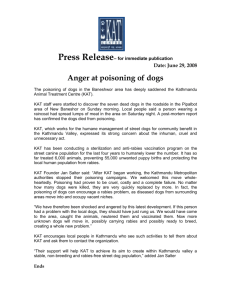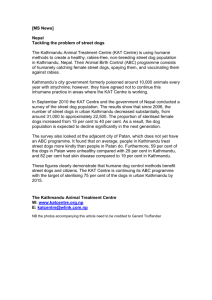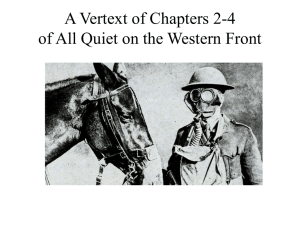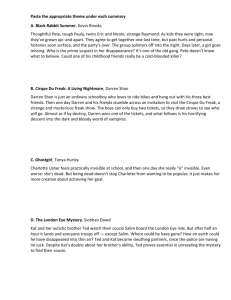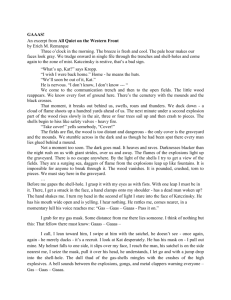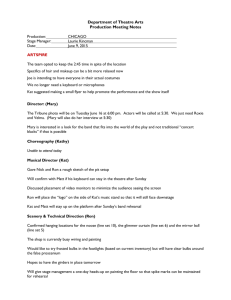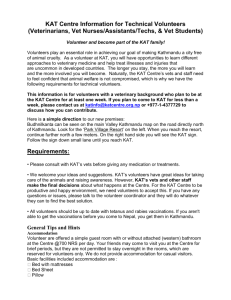Word format 70kb
advertisement
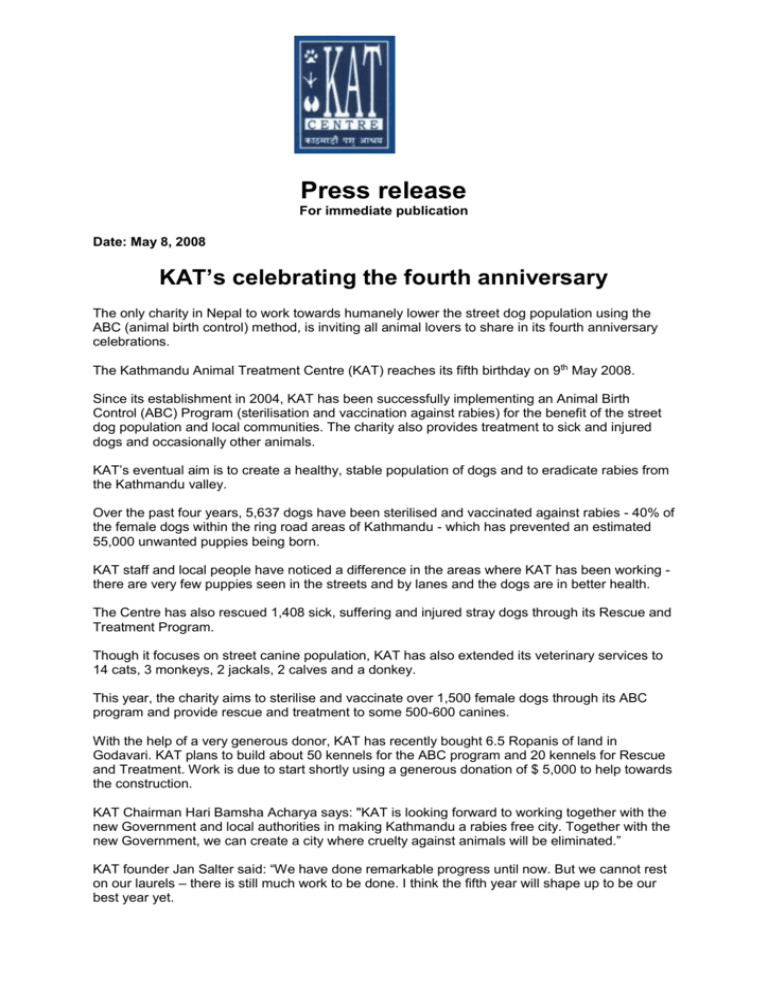
Press release For immediate publication Date: May 8, 2008 KAT’s celebrating the fourth anniversary The only charity in Nepal to work towards humanely lower the street dog population using the ABC (animal birth control) method, is inviting all animal lovers to share in its fourth anniversary celebrations. The Kathmandu Animal Treatment Centre (KAT) reaches its fifth birthday on 9th May 2008. Since its establishment in 2004, KAT has been successfully implementing an Animal Birth Control (ABC) Program (sterilisation and vaccination against rabies) for the benefit of the street dog population and local communities. The charity also provides treatment to sick and injured dogs and occasionally other animals. KAT’s eventual aim is to create a healthy, stable population of dogs and to eradicate rabies from the Kathmandu valley. Over the past four years, 5,637 dogs have been sterilised and vaccinated against rabies - 40% of the female dogs within the ring road areas of Kathmandu - which has prevented an estimated 55,000 unwanted puppies being born. KAT staff and local people have noticed a difference in the areas where KAT has been working there are very few puppies seen in the streets and by lanes and the dogs are in better health. The Centre has also rescued 1,408 sick, suffering and injured stray dogs through its Rescue and Treatment Program. Though it focuses on street canine population, KAT has also extended its veterinary services to 14 cats, 3 monkeys, 2 jackals, 2 calves and a donkey. This year, the charity aims to sterilise and vaccinate over 1,500 female dogs through its ABC program and provide rescue and treatment to some 500-600 canines. With the help of a very generous donor, KAT has recently bought 6.5 Ropanis of land in Godavari. KAT plans to build about 50 kennels for the ABC program and 20 kennels for Rescue and Treatment. Work is due to start shortly using a generous donation of $ 5,000 to help towards the construction. KAT Chairman Hari Bamsha Acharya says: "KAT is looking forward to working together with the new Government and local authorities in making Kathmandu a rabies free city. Together with the new Government, we can create a city where cruelty against animals will be eliminated.” KAT founder Jan Salter said: “We have done remarkable progress until now. But we cannot rest on our laurels – there is still much work to be done. I think the fifth year will shape up to be our best year yet. KAT Manager Khageshwaar Sharma says: "To deal with the estimated 20,500 dogs within the ring road is a big challenge, but our team is confident enough to handle the situation. During my field visits I have encountered many Kathmandu residents who are deeply concerned about the poisoning campaigns carried out to control the street dog population. To create a city where poisoning is a thing of the past, we hope that we will soon be able to expand our project to wider areas so that our program will have a quicker impact. “KAT has worked hard to bring about these positive changes in the lives of the street dogs in Kathmandu. KAT would like to thank the Kathmandu Metropolitan City and World Society for the Protection of Animals (WSPA) for their support and their role in helping to bring this about.” KAT also extends thanks to Kathmandu residents, Donors, Supporters, Volunteers and well wishers for their continued support which make our endeavours possible. ENDS Notes to Editors: For further information, pictures and arrangement for interviews, please contact By email: katco@katcentre.org.np By phone: + 977 1 4373169 By mobile: + 977 9841 - 310457 Kathmandu Animal Treatment Centre, Chapali Gaon, Budhanilkantha PO Box 8975 EPC 4120, Kathmandu, Nepal Tel +977-1 4373169 Email: katco@katcentre.org.np Website: www.katcentre.org.np Registered charity in Nepal 994/059-060 (social welfare council number 14998) and the UK (charity number 115822) The Kathmandu Animal Treatment (KAT) Centre is a registered charitable animal organization and receives funding from World Society for the Protection of Animals (WSPA, is the world's largest alliance of humane societies and animal protection organizations, representing over 800 Animal Welfare organizations in more than 147 countries. WSPA strives to create a world where animal welfare matters and animal cruelty ends). Before KAT started its work in 2004, dogs were routinely poisoned by the Kathmandu Municipality using meat laced with strychnine. The dogs took several days to die from painful convulsions, and the rotting carcasses were then dumped in the river causing a health hazard to local people and other animals. Through an Animal Birth Control program, street and community dogs are caught each day, taken to KAT Centre, treated for conditions such as worms, fleas and mange, and then sterilised and vaccinated against rabies. Once they are fully recovered they are released back where they came from with an identity mark on their ear. The Disaster Relief Program was conduct for animals in 2007, through an animal welfare organisation. The Humane Society International (HSI) and the Royal Society for the Protection of Animals (RSPCA) funded KAT and SAWM-Nepal to conduct a Disaster Relief Project in Holiya, Banke, Nepal following floods. KAT Veterinarian, Dr.Pramod Dhakal, who led a group of 8 staff, reported that some 5,000 animals (mainly livestock) were given veterinary treatment.
